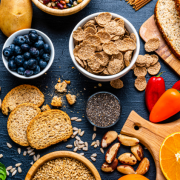Dr. Spencer’s Science-Based Smoothie for Gut Health

In the complex world of gut health, finding straightforward solutions that effectively support the microbiome can be challenging. For this reason, Sean Spencer, MD, PhD, Gastroenterologist and Physician Scientist at Stanford University, created a meticulously engineered morning smoothie recipe to support his own gut health. Guided by his deep understanding of the gut’s delicate ecosystem, this smoothie is not just a meal but a strategic tool for fostering a flourishing microbiome.
Ingredients:
- 1 cup spinach
- ½ avocado
- ½ apple
- 1 tsp green banana flour
- 1 tsp L-glutamine powder
- 1 scoop (20 grams) pea protein powder
- Top up with liquid of choice: water, coconut water, milk or nut milk (without additives)
Creating the Base
Dr. Spencer tailors his morning smoothie base with a focus on nutrient density and diversity, recommending a blend of apples, spinach, and avocado. Yet, he emphasizes the flexibility of the recipe to accommodate personal tastes and digestive responses. For those who find certain fruits, like apples, lead to bloating, Dr. Spencer says they can be easily substituted with other fruits like bananas or blueberries.
“I find spinach, apple, and avocado make a tasty combination, yet the door is open to experiment with different fruits to achieve a healthy blend of nutrients and fiber,” he states.
Dr. Spencer points out the unique contribution of avocados to the smoothie. Unlike many fruits, avocados are rich in healthy fats, crucial for delivering steady energy throughout the day. Moreover, they are remarkably high in fiber, with half an avocado offering six to seven grams, making up about a quarter of the USDA’s daily recommended fiber intake. This dual benefit of avocados enhances the smoothie’s nutritional profile, making it a powerhouse of sustained energy and digestive health.
When it comes to liquid choices, almond milk is Dr. Spencer’s preferred option, but he notes the suitability of any type of milk or coconut water as long as it’s free from inflammatory additives, such as added sugars and thickeners, which can negatively impact the microbiome when consumed regularly. He also cautions against the deceptive practices of some brands that claim no added sugars while employing enzymes that convert complex carbohydrates into simple sugars (such as alpha-amylase added to oat milks), effectively sneaking in unwanted sugars.
“To ensure the healthiest choice for your microbiome, I recommend opting for products with short and simple ingredient lists,” he states.
Pea Protein Powder
Dr. Spencer chooses pea protein for its gentle impact on the digestive system and its impressive nutritional profile. It also boasts a comparable protein content to whey and includes all nine essential amino acids—vital nutrients your body is incapable of producing on its own.
Dr. Spencer advises that choosing the right protein powder for your gut is not about type, but rather additives. Most protein powders on the market, including pea protein, are formulated with emulsifiers. These additives, such as soy lecithin, cellulose gum, xanthan gum, guar gum, acacia gum, and polysorbate 80, are used to enhance the powder’s mixability in liquids. Despite their practical benefits, emulsifiers come with a downside–they’re notoriously harsh on the microbiome.
Recent research has shed light on the detrimental effects of common emulsifiers, revealing their capacity to directly alter the gut microbiota and incite inflammation. Such disruptions can compromise an otherwise healthy microbiome, underscoring the importance of choosing products wisely. A randomized controlled trial illuminated the extent of this impact, showing that the inclusion of emulsifiers in the diet over a mere 11-day period led to a noticeable decline in microbiome diversity and a reduction in the production of beneficial metabolic byproducts, or postbiotics.
Green Banana Flour (Resistant Starch)
Green banana flour enriches the microbiome with its high resistant starch content, a form of fiber with powerful benefits to the microbiome. Resistant starch has many health benefits and earns its name for its ability to bypass digestion in the small intestine, journeying instead to the large intestine. Here, it serves as a vital food source for beneficial gut bacteria, promoting a robust and healthy microbiome. The fermentation of resistant starch by these microbes results in the production of valuable postbiotics, such as short-chain fatty acids, essential for maintaining gut health. As bananas ripen they convert their starch to simple sugars, while the starch in green bananas remains intact, retaining its prebiotic properties.
Dr. Spencer also mentions other fiber supplements like psyllium husk, which, although beneficial for digestion and adding moisture to bowel movements, does not serve as a fermentable food source for the microbiome. This distinction highlights the importance of choosing fibers that not only facilitate physical digestion but also actively contribute to the microbiome’s health.
“Other prebiotic supplements and sources exist. However, I choose to supplement with a resistant starch source because it has strong evidence that it is an accessible and fermentable source of fiber for microbiome,” he says.
While Dr. Spencer regularly uses green banana powder as a prebiotic supplement, he emphasizes the significance of incorporating a variety of fiber sources into one’s diet, noting this shouldn’t be the only fiber source in the day.
“A diverse intake of fibers is crucial for a thriving microbiome, and I recommend consuming other prebiotic-rich foods such as potatoes, whole grains, beans, legumes, nuts, seeds, and a wide array of fruits and vegetables throughout the day,” he says.
L-Glutamine Powder
L-Glutamine offers a range of benefits for gut and microbiome health, such as reducing GI symptoms after morning workouts. It’s also recognized for its role in maintaining the integrity of the intestinal lining and reducing the inflammatory response during gut lining irritation.
Furthermore, L-Glutamine serves as a vital energy source for the cells within the small intestine. This attribute is essential for maintaining intestinal health and addressing conditions where impaired intestinal barrier is present because it decreases gut permeability and reinforces the intestinal barrier.







